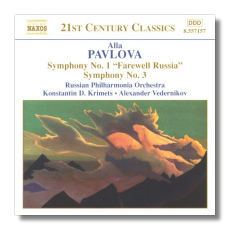
The Internet's Premier Classical Music Source
Related Links
- Latest Reviews
- More Reviews
-
By Composer
-
Collections
DVD & Blu-ray
Books
Concert Reviews
Articles/Interviews
Software
Audio
Search Amazon
Recommended Links
Site News
 CD Review
CD Review
Alla Pavlova

Symphonies #1 & 3
- Symphony #1 "Farewell Russia"
- Symphony #3
Russian Philharmonia Orchestra/Konstantin D. Krimets
Russian Philharmonia Orchestra/Alexander Vedernikov
Naxos 8.557157 DDD 66:46
Here's a composer I've never heard of. Alla Pavlova was born in Russia in 1952, and remained behind the Iron Curtain until 1990, when she came to New York. Within a few years, the Soviet Union changed almost beyond recognition, and when she visited Russia in 1994 (as a representative of New York Women Composers, Inc.), she was moved by the bittersweet spectacle of Moscow stumbling its way out an old world and into a new one. This explains the subtitle of Pavlova's First Symphony.
The one-movement, 26-minute symphony is written for a chamber orchestra of twelve instruments: string quintet, two flutes, piccolo, harp, piano, vibraphone, and tam-tam. The piano is given three prominent solos, but all of the instruments come into prominence at one point or another. The music is almost uniformly slow and quiet. Suffused with a post-Romantic melancholy, it seems to wander abstractedly through a softly glowing mist. The chamber scoring emphasizes the First Symphony's gently luminous colors. Fans of Valentin Silvestrov's Fifth Symphony will respond well to this work. (Konstantin D. Krimets is the conductor.)
The Third Symphony, scored for full orchestra with prominent solo duties for the guitar, was written almost six years later. Supposedly it was inspired by a monument of Joan of Arc on New York City's Riverside Drive, although the composer cautions us against hearing the symphony as a musical biography or as a psychological portrait. In this work, contrast and clarity supplant the First Symphony's moody atmospherics. Oddly, the Third Symphony sounds more Russian than its discmate. The melodies are not far removed from folk or even popular idioms. ("Doctor Zhivago" is not far away.) Indeed, Pavlova seems to have wanted to write a symphony that could speak to a wide range of listeners, even those who don't often listen to classical music. If that is the case, then she has succeeded, and without condescension or tastelessness. The New Romantic movement finds an eloquent and sincere flowering in this symphony. (Alexander Vedernikov is the conductor.) Given the backward-looking qualities of these two symphonies, it is ironic that this disc is part of Naxos' "21st Century Classics" series.
The Russian Philharmonia Orchestra is less than ten years old; it was established for film and television work, but it soon became independent and took on other duties. The performances are more than competent, and the engineering, while a bit lacking in hall ambiance, is pleasing.
This music, particularly the Third Symphony, doesn't stretch musicians or listeners very much, but it is well constructed and an undeniable balm for tired minds and bruised ears.
Copyright © 2004, Raymond Tuttle




















